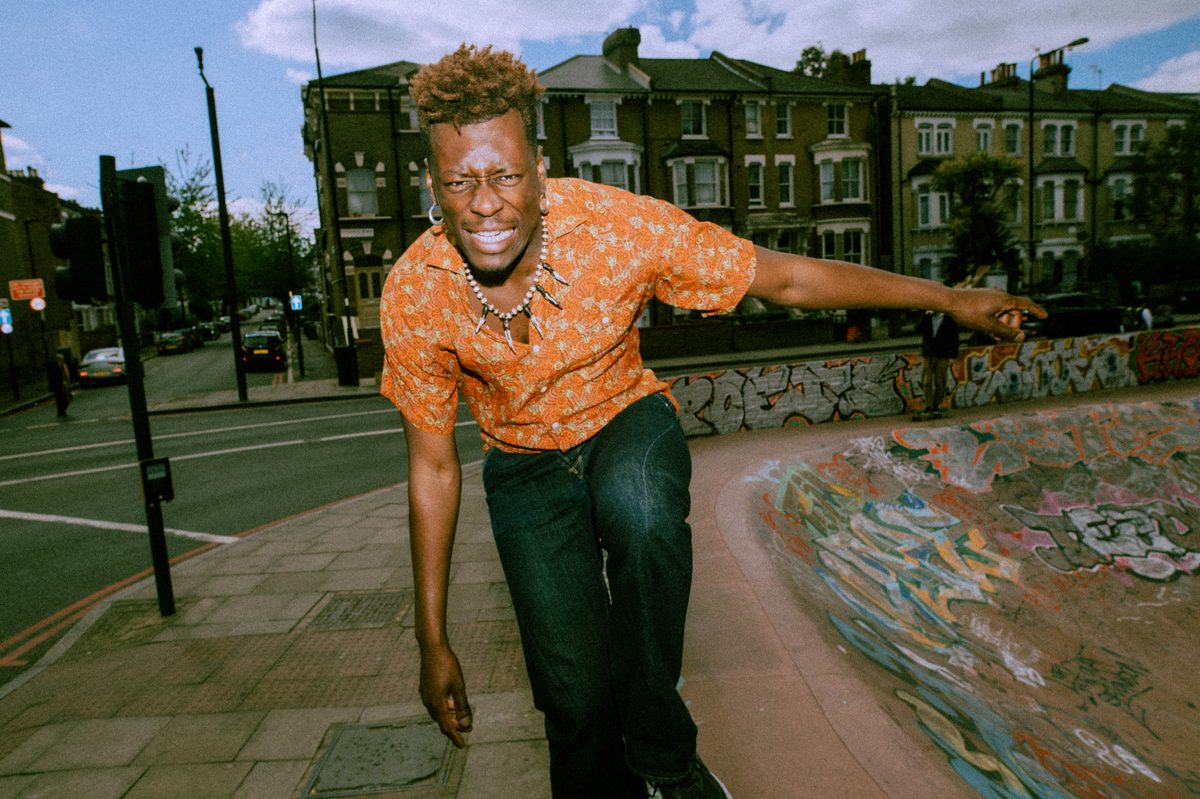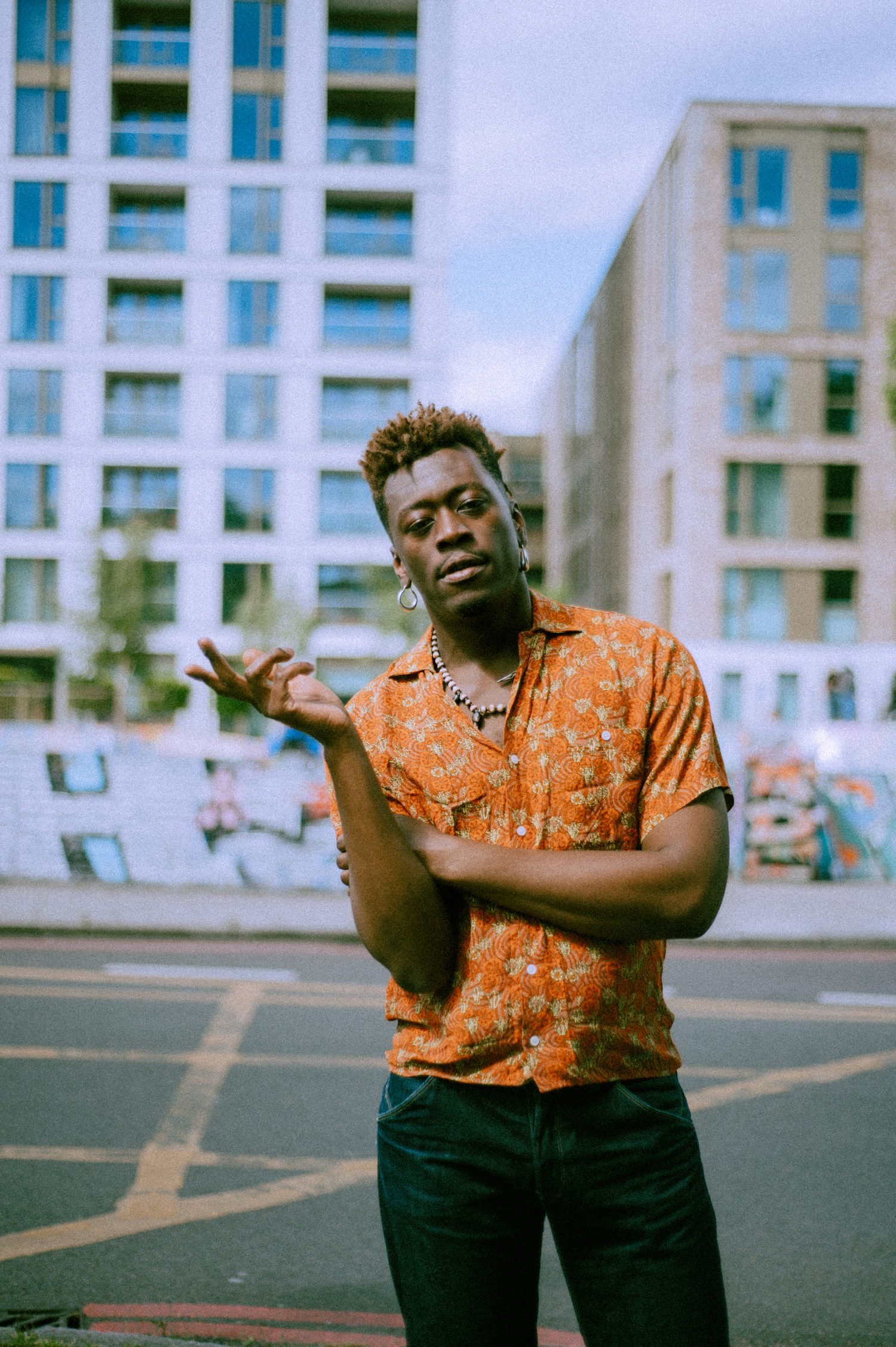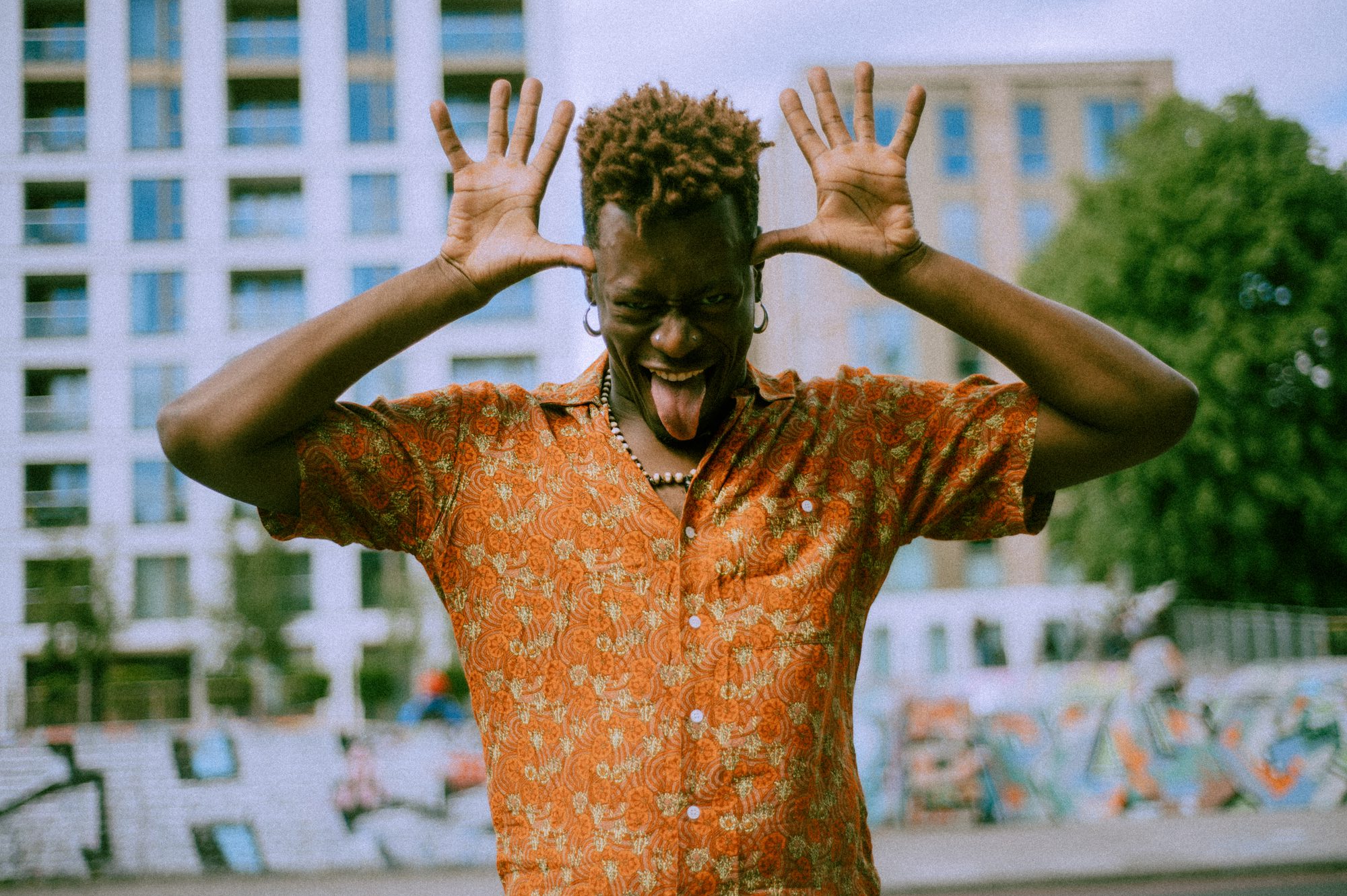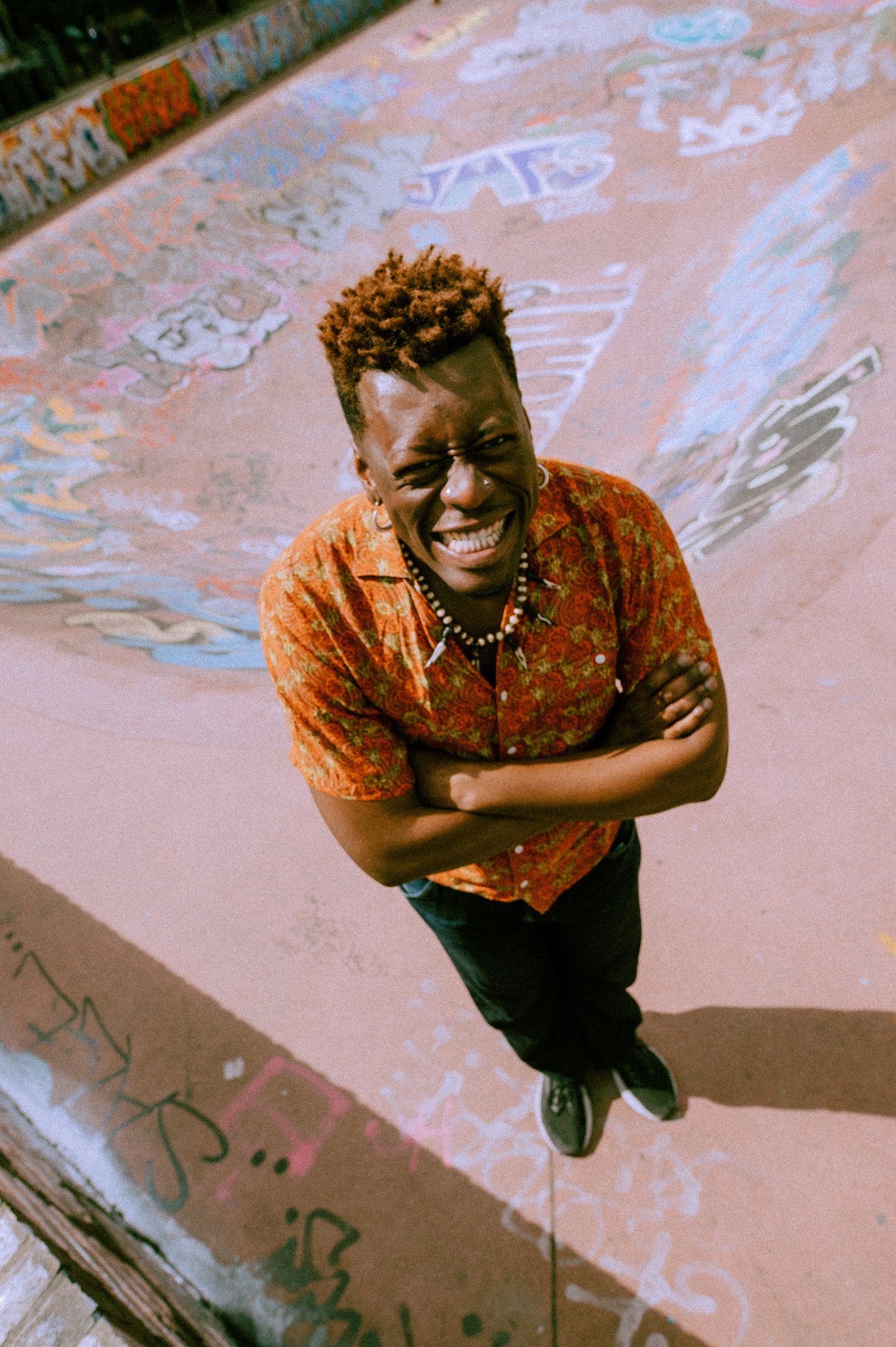
On the Rise
Boko Yout
Swedish noise-disrupter Boko Yout is blending post-punk chaos and ancestral storytelling into a sound that builds upon an ecosystem of artistic expression
Boko Yout is making music that is shaped by survival.
GUSTO – the debut album from Stockholm-born artist Paul Adamah – plays like a long-form therapy session, introducing listeners to Boko Yout’s alter ego Dr. Gusto, who guides us through shadows of shame toward self-liberation in a world where queer and diasporic identities must fight to be seen, heard, and validated. When we speak, Adamah is on holiday in Greece. He’s taking a break, and learning how to relax.
“Right now is a moment for me to take in and not write anything,” he says. “I’m just reading, journaling, writing poems, and having epiphanies like, ‘Oh shit, I think like this because of something that happened back then.’ Then I stop. It’s okay to move on. I’m doing the Gusto thing — talking to myself and filling journals with anecdotes and realisations. It's time to accept that I want to rest, and that’s okay.”
“The Gusto thing”, as he calls it, is a casual maxim for a philosophy that runs deeper than just a character. Adamah identifies the persona as “...a manifestation of my soul, and the voice that pushes me towards individuation.” Dr. Gusto is a mirror, and GUSTO articulates Adamah’s path toward self-preservation and belonging, free from social constraints. His ability to split himself in two – one side confronting, the other protecting – began long before music found him. Raised in the small Swedish city of Örebro by a Togolese father and Mozambican mother in a predominantly white, Protestant culture, Adamah learned early on what it meant to shapeshift.

“Being Black in Sweden is the weirdest shit ever,” he laughs, masking the ache beneath. The burden of silence, coded behaviour, and shrinking to fit spaces not made for him shaped his youth. In addition to navigating how to integrate his diasporic identity, Adamah also faced pressure to conform when it came to spirituality and sexuality. “I grew up going to church on Sundays and singing songs,” he says.
“My friends were really religious, so I had pressure to find my spirituality. Growing up around boys, we had a way of joking and a certain status. That pressured me to uphold masculine ideals, hating femininity in many ways. So, I started suppressing my identity. I was hiding and denying it.” Acceptance meant safety. He recalls a version of himself that’s quieter, watchful, and carefully camouflaged. “It’s always a matter of survival when it comes to sexuality. Staying safe, not getting cast out by family and friends. I wanted to feel accepted. Being something I’m not was protection.”
Music gave him a glimpse of freedom. It was an outlet to say what he couldn’t before, loosening the armour that he worked so hard to fortify. Captivated by YouTube’s golden era of blog-rap, he found fraternity and inspiration through Odd Future – the hip-hop collective that he calls his “first love.” “Seeing these odd kids from LA make scary rap, being brash, nasty, and expressing themselves with no limits made me realise you don’t have to just make music. You can express more.” Reminiscing on the days of audacious mixtapes and Odd Future doughnut merch as badges of honour, Adamah speaks fondly of the community that Odd Future built. It allowed him to feel a sense of belonging, even if he didn’t feel at home where he lived. This sparked his own journey: making lo-fi beats with his brother, turning poetry into rap, and chasing inspiration online. “I used to Google everything. It was the only way I could show myself to myself.”
Music wasn’t Adamah’s only calling. When he wasn’t searching for new recording equipment, he was looking into art supplies, experimenting with different methods of expression. Eventually, he moved to Stockholm to study Free Arts at the Royal Institute of Art. It’s a decision that deepened his creative practice, though not without some friction with the structure of traditional education. Adamah recognised that he would have to modify things to work for him. This may have involved missing a few assignments to tour with Viagra Boys, he admits, but there’s nothing like learning on the job. “I’ve always thought that my music or whatever I do outside of school is still art,” he tells me. “But hey, I don’t make the rules!”
Rule-bending became central. Higher education helped him articulate his work among fellow artists who led with strong personalities. “People have different ways of talking about their art, but we’re all confused and on the same journey. Nobody’s one-hundred percent done.” Embracing perpetual change excites him, and he hopes others take that from his work. “I want people to know I’m always changing. I’m not trying to sound like anyone else or even myself a year ago. I just want to explore and see what happens if I follow the feeling.”
But practical challenges remain, as addressed by GUSTO’s opening tracks “IGNORED” and “9-2-5”. “IGNORED” draws on a metaphor from the Royal Institute of Art: two statues at the entrance, a lion and a boar. Adamah tells me that in his first year, he was given a copy of the play In Like a Lion, Out Like a Swine, which is based on those statues. “I’ve always admired them, because they’re so iconic,” he recalls. “I was hooked on the idea of the lion representing the person that you come in as. The fiery soul who wants to try everything, who’s kind of naive, and hungry to take on the world with their art. Whereas the swine is who you come out as. A cynical artist that feels life is working against you.”
“As I went through my first two years, I felt like the lion. I don’t want to fall in line, and that’s the mindset that I carry.” “9-2-5” continues the narrative with a brash imagining of Adamah’s worst-case scenario: joining the rat race. “I wrote those two songs hand-in-hand as a potential scenario. What if I didn’t have school? What if they expelled me and I had to get a job, going back to ideals of hyper-productivity and overworking that are plaguing everyone?”

Although this vision was portrayed through a character separate from himself, Adamah notes that he will be making a brief return to the working world while he’s out of school in autumn. Yet, his appetite for growth as a musician is insatiable. “Dr. Gusto would definitely say that’s not the path for me,” he tells me. “It’s not what is laid out. It is coming from a state of lack, and a state of resistance to my true purpose.”
“I want to remain the lion,” he affirms. “I want to be curious about life. I want to learn more. I’m at the first steps of figuring this music thing out. How do I work away my shame? Who will I become after that?”
The answer lies in his craft. “The art I’m doing now is a protest to that little boy under pressure and shame. The music, the art, the way I move on stage, it’s all a manifestation. A way to live through it all and tell a story.” Throughout GUSTO, Adamah purges what held him back to find joy, undoing patterns that no longer serve him and learning to reconnect. “I’ve been part of this loneliness epidemic,” he admits. “Part of healing is finding a community I love so much.”
That community extends to his roots. Recently, Adamah began reconnecting with vodún traditions from his father’s side – a practice he once feared. “I feared vodún because of the view that anything not Christian is demonic,” he says. But fear has given way to understanding and reclamation. “Learning about my father’s connection to vodún has helped me find home. It’s a big part of life in Togo, where he’s from. I couldn’t deny it anymore, and I want to honour it.” He also unearthed his father’s past as a music lover, discovering that he quietly released music years ago. “It was wild hearing his voice. It sounds so much like mine. It felt like finding a secret part of myself through him.”
Unlearning alarmist narratives has helped Adamah embrace his identity fully. Reflecting on his period of rest, he cites a book that inspired him: To The Friend That Did Not Save My Life by Hervé Guibert, chronicling a man diagnosed with AIDS during the peak of the epidemic. “When I came out, my mom told me, ‘You’re gonna get HIV, you’re gonna die’. I was terrified. It was traumatic because it’s such a heavy burden on gay people. But it’s an act of love to understand what happened and the privilege I have.” The book is also a poignant reminder of progress and the legacy Adamah faithfully carries. “It makes me think of those elders who could have been here. Understanding I’m part of that history through my music and existence makes me think about how to carry my legacy and help other queer people.”
Live, Boko Yout brings Adamah’s layered world into focus. Supporting Viagra Boys last year, he began to perform on his own terms, claiming hard-earned space. “I used to be scared to move a certain way,” he says, alluding to fears about femininity onstage. “As soon as I embraced that I was just me, this queer superstar, people started moshing and dancing naturally. Some places took longer to embrace me, others got it right away. It connects when I don’t hold back.

For all that he’s uncovered, Paul Adamah’s journey as Boko Yout is just getting started as he exposes the facets of his mind that he once kept quiet, with soul purpose as his compass. “I like the term joyful expansion. Always acting out of your greatest desire or greatest joy. That’s what I’m doing now,” he says with a sense of contentment. It’s a daily practice, and a declaration to keep moving forward on his terms. Right now, that means rest, reflection, and curiosity. But it’s also a promise, to himself and to the community he carries with him, that the best is still to come.
In a world where survival can feel like the only option, Boko Yout is creating a new blueprint: one where liberation and joy coexist, and where being truly seen is the ultimate act of resistance.
Get the Best Fit take on the week in music direct to your inbox every Friday

Lorde
Virgin

OSKA
Refined Believer

Tropical F*ck Storm
Fairyland Codex





